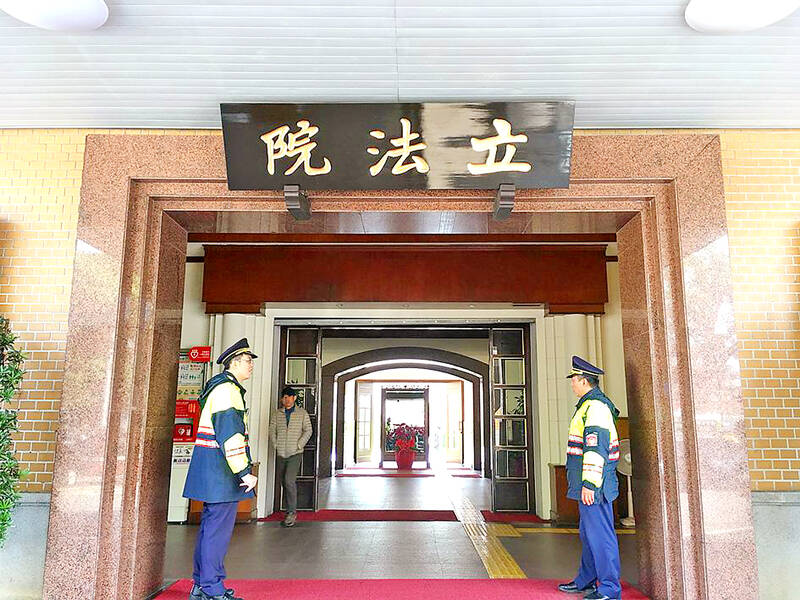The Taiwan Bar Association yesterday urged legislators not to circumvent established procedures to push through legislative reforms, while condemning a massive brawl that erupted between lawmakers on Friday.
Voting on the amendments to Article 15 of the Act Governing the Legislative Yuan’s Power (立法院職權行使法) — proposed by Chinese Nationalist Party (KMT) and Taiwan People’s Party legislators — was eventually done close to midnight by a show of hands without recording the names of the voters after scuffles and procedural stalling tactics by Democratic Progressive Party (DPP) lawmakers.
The association in a statement said that one party was “wrecking the operating principles of Taiwan’s constitutional democracy” to pursue its own interests.

Photo: Lin Liang-sheng, Taipei Times
The actions of opposition lawmakers to push through bills that would expand legislators’ powers and authorize funding for infrastructure in the east were taken without deliberation or review in legislative committees, in an effort to go straight to voting to pass a third reading, it said.
“The bills would have a great impact on the functioning of the government and the nation’s democratic constitutional order. They would also involve planning and authorization for significant portions of the budget, and have important ramifications for all people,” the association said.
It urged lawmakers to abide by democratic principles and follow legislative procedures, to ensure that bills receive legitimate scrutiny.
In addressing significant amendments and bills for major public infrastructure projects, the legislature must confer with all members for deliberation and receive feedback through established procedures before voting, it said.
The proposed bills would make “contempt of legislature” a punishable offense, while seeking more than NT$2 trillion (US$62.1 billion) for highway and high-speed rail projects.
The Legislative Yuan did not exercises its mandated functions in ensuring that the bills followed legislative procedures, and it had contravened those rules by voting using a show of hands, the association said.
KMT spokeswoman Yang Chih-yu said that a vote by a show of hands conforms to Article 35 of the Rules of Procedure of the Legislative Yuan (立法院議事規則).
The bills had gone through three public hearings and a presentation at a dedicated meeting, Yang said.
She said that DPP lawmakers had disrupted procedure by raising 40 motions to adjourn, when the bills underwent a clause-by-clause review at legislative committee meetings.
“We request that when speaking on these issues, the Taiwan Bar Association base their comments on facts,” she said, adding that association chairwoman Yu Mei-nu (尤美女), a lawyer and former DPP legislator, has political leanings on the issue.
“We ask Yu not to have double standards, and to remember the need to reform the Legislative Yuan,” she said.
Additional reporting by Lin Hsin-han

Intelligence agents have recorded 510,000 instances of “controversial information” being spread online by the Chinese Communist Party (CCP) so far this year, the National Security Bureau (NSB) said in a report yesterday, as it warned of artificial intelligence (AI) being employed to generate destabilizing misinformation. The bureau submitted a written report to the Legislative Yuan in preparation for National Security Bureau Director-General Tsai Ming-yen’s (蔡明彥) appearance before the Foreign Affairs and National Defense Committee today. The CCP has been using cognitive warfare to divide Taiwanese society by commenting on controversial issues such as Taiwan Semiconductor Manufacturing Co’s (TSMC, 台積電) investments in the

INVESTIGATION: The case is the latest instance of a DPP figure being implicated in an espionage network accused of allegedly leaking information to Chinese intelligence Democratic Progressive Party (DPP) member Ho Jen-chieh (何仁傑) was detained and held incommunicado yesterday on suspicion of spying for China during his tenure as assistant to then-minister of foreign affairs Joseph Wu (吳釗燮). The Taipei District Prosecutors’ Office said Ho was implicated during its investigation into alleged spying activities by former Presidential Office consultant Wu Shang-yu (吳尚雨). Prosecutors said there is reason to believe Ho breached the National Security Act (國家安全法) by leaking classified Ministry of Foreign Affairs information to Chinese intelligence. Following interrogation, prosecutors petitioned the Taipei District Court to detain Ho, citing concerns over potential collusion or tampering of evidence. The

‘COMPREHENSIVE PLAN’: Lin Chia-lung said that the government was ready to talk about a variety of issues, including investment in and purchases from the US The National Stabilization Fund (NSF) yesterday announced that it would step in to staunch stock market losses for the ninth time in the nation’s history. An NSF board meeting, originally scheduled for Monday next week, was moved to yesterday after stocks plummeted in the wake of US President Donald Trump’s announcement of 32 percent tariffs on Taiwan on Wednesday last week. Board members voted to support the stock market with the NT$500 billion (US$15.15 billion) fund, with injections of funds to begin as soon as today. The NSF in 2000 injected NT$120 billion to stabilize stocks, the most ever. The lowest amount it

NEGOTIATIONS: Taiwan has good relations with Washington and the outlook for the negotiations looks promising, Minister of Economic Affairs J.W. Kuo said Taiwan’s GDP growth this year is expected to decrease by 0.43 to 1.61 percentage points due to the effects of US tariffs, National Development Council (NDC) Minister Paul Liu (劉鏡清) said at a meeting of the legislature’s Economics Committee in Taipei yesterday, citing a preliminary estimate by a private research institution. Taiwan’s economy would be significantly affected by the 32 percent “reciprocal” tariffs slapped by the US, which took effect yesterday, Liu said, adding that GDP growth could fall below 3 percent and potentially even dip below 2 percent to 1.53 percent this year. The council has commissioned another institution